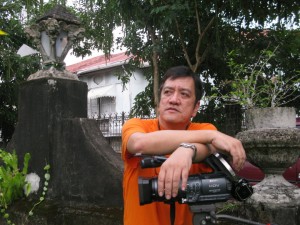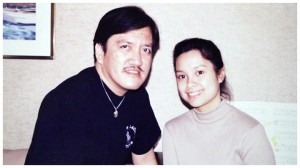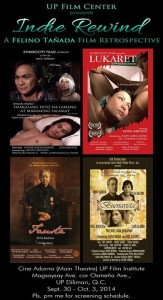Featured Lucenahin: TV/Indie Film Director Felino Tañada
This week, join us as we sit down for an interview with Mr. Felino Tañada—a prominent Lucenahin, renowned filmmaker, and TV/Indie Film director whose latest project is Hermano Puli: Ang Kasaysayan ng Isang Bayani, a truly satisfying piece of film-making that’s hitting the theaters this June. He was also the man behind the camera for the historical films Fausta and Buenavista.

Direk Felino Tañada
Photo from Felino Tanada (Facebook Page)
What sparked your interest in filmmaking and directing?
I’ve been enthralled by the magic of filmmaking even in my early childhood. I remember I was only in Grade 2 when I used to sneak into a movie house right after school and would come home right before dinnertime. At that time kids my age get to see a movie for free.
My parents knew that I spent most of my time in the movie house so they didn’t bother looking for me. I must have watched movies three to four times a week. I loved sitting in that dark hall watching all those black and white images unfold in the silver screen. It was an exhilarating experience.
When did you know you wanted to be a director?
I didn’t plan on becoming a director. It just so happened that a lot of doors opened and a string of events came together that led me to my present career. I guess it was all part of my destiny. I was in 3rd year of high school in Maryknoll Academy (now Maryhill College) when I joined the school’s Dramatic Guild, I was tasked to direct a one act play right away. That led to my directing and acting in other theatre productions.
After graduating high school I wasn’t sure what course to take in college but then a classmate of mine showed me a school brochure (in Manila) that offers a four year course in Theater Arts. Eureka! I enrolled in that school and worked with one of the country’s top stage directors – Zeneida Amador of Repertory Philippines.
After college I worked in various television and recording companies until I left the Philippines to pursue formal training in filmmaking. I earned my second Bachelor of Arts Degree with Majors in Film and Television Production from Columbia College of Broadcasting in Hollywood, California. My first job in Hollywood was a film editor until I got promoted to Head of the Post Production Dept. after 6 months. My yearning to fulfill my ultimate dream of becoming a full-fledged director happened after I quit my Hollywood job and started directing TV movies for ABS-CBN. As usual, the rest is history.
Why do you make films?
I make films because there are stories that need to be told. Filmmakers are storytellers using the medium of cinema. It’s a passion that burns in your heart and soul. We always have this craving to create and direct. If the world runs out of stories then people like me become extinct.
What’s it like being in the film industry?
I’ve been in this industry for almost all of my life and it is a roller-coaster ride. There are ups and downs. You have to be patient and strong-willed to survive. There are all kinds of people that populate this business. One moment they will praise then stab you in the back the moment you walk away. Yet, even with all the lies, deceits and intrigues in this industry, the emotional payoff is quite fulfilling when you see the product of your hardship playing on the big screen. In spite of all the ‘behind –the-scene’ dramas, this industry makes you feel alive. It’s very addictive.
How would you describe your style as a director?
I don’t really have a distinct style as a director. I just do things that are needed to make a scene look good. I’ve worked with many good and bad actors and I learned a lot from them. They tell me that I am always calm on the set. Well, because I can get things done without having to yell and scream at my cast or production staff. What really ticks me off are actors who come late to the set, unprepared, and not knowing their lines.
How would you describe your voice as a filmmaker in 3 words?
Love your Passion.
Can you name some of the films, presentations, or stage plays that you have directed?
I would need a bigger space to post them all here. My Bio Data is ten pages long. I guess you have to Google search my name and that will reveal some of the stuff I’ve done. Some of the recent ones worth mentioning here are the historical films I did like: Fausta, Buenavista, and my latest bio pic—Hermano Puli: Ang Kasaysayan ng Isang Bayani.

Direk Tañada with Lea Salonga
Name some local celebrities that you have directed in the past.
I’ve worked with some of the big and small names in the industry like the veteran Eddie Garcia, Delia Razon, Ricky Davao, Luis Alandy, Glydel Mercado, Ruffa Guttierez, Richard Gomez, Gretchen Barreto, Lea Salonga, Perla Bautista, Tommy Abuel, Cory Quirino, Jon Santos, Nonie Buencamino and the list goes on…
How do you coax actors to give genuine, emotional performances on a set?
I don’t usually coax my actors. When I’m on the set, I expect them to know what they are supposed to do in terms of characterization in a particular scene. My scripts are written in such a way that it will describe how the actors would feel and what actions they have to take. That way it lessens my time in telling them what to do. I love working with actors who are prepared. When I work with first time actors, I would tell them not to act but just be their natural selves.
Tell us about the numerous awards you’ve received for directing.
Well, I was chosen as one of Natatanging Anak ng Lucena Awardees in the field of Arts. Unfortunately, I don’t have trophies to brag for my accomplishments in directing films because I don’t enter those movie competitions. I make movies not to compete but to fulfill a vision and to tell my stories. The only award I got was when I received a Gold medal for Achievements in Dramatics in high school. Plus a roomful of Recognition and Appreciation Plaques and Certificates.
Where do you go for inspiration?
From people I meet daily. From real life events that I read in newspapers. I’m a keen observer of my surroundings. When there’s nothing to be found outside of my physical world, I would go deep in the bottom of my soul and there I find a treasure trove of inspirations.
What does taking risks mean to you?
Everything that we do in this world is a risk and we should always be ready to accept the consequences. Risk taking is what drives us to get what we want. If we don’t take a risk of making that first step, we’ll be stuck in that same spot for life.
What are your day-today responsibilities as a TV/Indie Film Director?
When I am working on a film, especially on a big project, there is no one way of doing things. Everything depends on the requirements that need to be addressed. There are endless meetings, endless research, looking for the right people to put in the cast, and a million other details. Filmmaking involves a lot of people. It is never a one man show. The director should always be on top of the situation the whole time.

A Felino Tañada Film Retrospective
How was the experience working on your latest film, Hermano Puli: Ang Kasaysayan ng Isang Bayani?
The movie about the life of Hermano Puli has been in the backburner since 2008 when I first wrote the script. It took six years before it has seen the light of day. I knocked on so many doors, begged on my knees to find funding for this film. But I guess everything happens on its own time.
With the special support from my high school friends, the story of Puli has been finally put on film. This was not an easy project. A thorough historical researched was launched. Casting the right people was a daunting task. From costume and set design, to props and authentic locations, to getting the hundreds of extras and the thousands of costumes to be made, to feeding hundreds of cast and transporting them to the set…from the endless hours of editing and post production to the mastering…the logistics are quite mind boggling at best. The result was a truly satisfying piece of filmmaking that I am very proud of despite the minimal budget.
What would you like to achieve before the end of the year?
By the end of the year, I am hoping that we would have done showing the Hermano Puli movie to all the students of Quezon province since this is his 200th year birth anniversary. We also plan to have free showings in all public plazas of every town in Quezon. When all inhabitants of this province know the real life story of Hermano Puli and why he is called the first hero of our province, then I can say that Hermano Puli did not die in vain. After all of this has been said and done, I am looking forward to start my next film project. The title is still a secret.
What skills are important for a successful career in the film industry? Do you have any tips for budding filmmakers and directors?
There is no sure fire formula for a successful career in the film industry. But being a student of life, and a good observer of things and people around you, a good background in the field of arts, lots of patience and good connections could land you a decent spot at the bottom of the totem pole.
Sometimes this industry could be very vicious and could eat you alive if you are not ready to take criticisms and failure. It will tear you apart. Humiliate you and leave you physically and psychologically messed up. If you want to be a director, you must study well and fight hard for your long held beliefs. Don’t surrender your principles. And lastly, keep that passion burning, no matter what.

 Philippine Peso
Philippine Peso